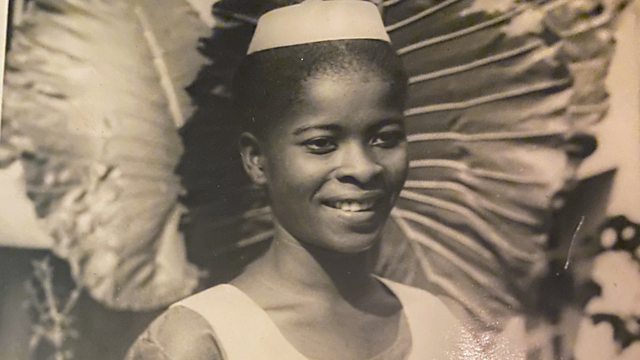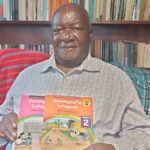Nurses from Africa are a vital part of the UK’s medical workforce. Cecilia Anim who migrated from Ghana to the UK in 1972 is one nurse who has made her mark in the UK’s National Health Service. Humans of Africa is celebrating her achievements and shares her story which has made history.
Cecilia Anim grew up in Western Ghana and always wanted to be a nurse. Her aunt had been one of the many to leave after independence in 1957 to train and work abroad. Her aunt was a nurse in Manchester in the 1950s and her visits to Ghana inspired a young Cecilia.
“My aunt said that nursing in the UK is quite different. There was an opportunity to learn new skills and actually you can be what you want to be. Resources are also there to support you. But one thing she kept saying, that sometimes as a black person it’s very difficult to fit in.”
Cecilia Anim qualified as a midwife and by the time she was 21 she was running a clinic in Ghana.
“I was running a health centre on my own in the Western region of Ghana. The doctor visited once a week and I was able to do most things. If there was a problem I had a contact at the hospital which was only 21 miles away. I did maternity care, antenatal care, looked after the children’s immunisation and looked after the village and its surrounding villages.”
She loved her job but the accounts of her aunt’s time in the UK stayed with her. At the time having a chance to live, work or study abroad was seen as a sign of progress and ambition.
“Coming to the UK was a great achievement for any family at all. They looked to you to be able to support the others back home in Ghana. It was a privilege. My auntie is in the UK, I used to boast like that when I was in training.”
In 1971, she applied for a visa and with financial help from another aunt she bought a plane ticket to London. She knew exactly what she wanted from her time in the UK.
And like many before her, the idea was to gain experience abroad to support her family at home and to learn new skills. Originally, she wasn’t going to stay permanently.
“I was planning to come and do my nursing training and then stay and work and get more experience, make some money and for every Ghanaian [abroad] all that we aim for is to build a house so that when you go home you have somewhere to stay. So that was my aim: to work, save money, learn through new experiences and go back.”
Cecilia Anim left Ghana in December 1972 to live with her aunt in London.
“I arrived at Heathrow Airport and it was a gloomy December morning with drizzles of rain and everything looked so miserable and I said, ‘oh my God, there isn’t even a sun here!’ and my auntie said we are in winter; the sun will come between spring and summer. So I said, ‘do I have to wait for that then?’ It was a shock. A lot of things were going through my mind like have I done the right thing? I was questioning myself.”
After settling in she discovered that her five years of training as a qualified nurse in Ghana didn’t count in the UK. So she started applying for nursing colleges.
“The certificate that I acquired by the central midwifery board in Ghana was not recognised. I mean at the time nothing is recognised unless it had the UK stamped on it. They gave me two options.
‘Because you are new here we want to start you with the enrolled nursing training.’ I said no I don’t want to do the training having worked.’
“I was very angry and said, ‘how dare you? I have run this maternity home, I did my job very well and I’ve got a very good testimonial. I was very angry. But then I felt they had the right to do whatever they wanted to do.”
She was offered a place on a two year training course and was told that if after the three months they saw that she was doing well that she’d be able to move to the advance three year course.
“I was the top of my class.”
One year after being in the UK she was on the train from London to a college in Hull in the north of England, 200 miles away from London.
“It was small and people were friendly. I loved it. Hull is a sleepy town and London is where the bright lights are.”
After a few weeks she began working on a ward in the local hospital where she was the only black nurse.
“I had a lot of anxiety about going to the ward.”
‘Am I going to be accepted? What is it like? How are they going to take me?’
“I was put on the elderly ward. The elderly ladies, some of them found it very difficult especially when it came to personal care – they didn’t want touch like ‘don’t touch me with your filthy hands’ some of them exclaimed. It didn’t bother me because I know some people might have not seen a black person in their lives.”
“After I remember the lady who told me to get my filthy hands off, the daughter came and apologised and said ‘my mum has never travelled even to London. So you are an alien to her.”
Meanwhile most of Cecilia Anim’s colleagues were curious about her.
“People were friendly actually. The nurses were so excited to see a black person and asked me all sorts of questions. Some of the questions were sarcastic but I put it to ignorance.”
It wasn’t easy in the beginning and she’d experienced loneliness. But eventually made friends and met some kind people in the local community.
After three and a half years in Hull she moved back to London for better career opportunities. By this time she got married and decided to make the UK her permanent home. She wanted to take on more senior roles within nursing but came up against obstacles.
“When it comes to promotion, training and development, you feel that you have to work twice as hard to get to where you want to be. While others just walk through, you’re running, you’re breathless and you’re still not getting there.”
The Royal College of Nursing is the largest union for nurses in the UK. It is through this organisation that Cecilia Anim found a space to challenge the frustrations she and other nurses experienced.
“This was the reason I really wanted to up my game in the union to correct all these injustices. The issues will be structural racism and institutional racism. They will give you the application form, you fill it and you go for the interview. They tell you that you haven’t passed. What are you going to do? If you challenge they will find a flimsy excuse. So we need to change that.
Her work with the Royal College of Nursing also gave her the opportunity to fulfill her leadership aspirations.
In 2015, she became the first black woman to become the President of the Royal College of Nursing trade union in its 100-year history.
“I’m very proud and I think I am satisfied with what I have been able to achieve. I think it was a cherry on the cake and I think it was also being able to reach that , crowned it all for me and history will remember that.”
In 2017, Cecilia Anim was awarded a CBE by the Queen of England for her contribution to nursing and a United Nations award for Women of Excellence from the African diaspora. She has also been awarded honorary doctorates from universities in the UK including the University of Hull and is now Dr Cecilia Anim.














